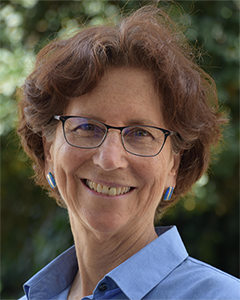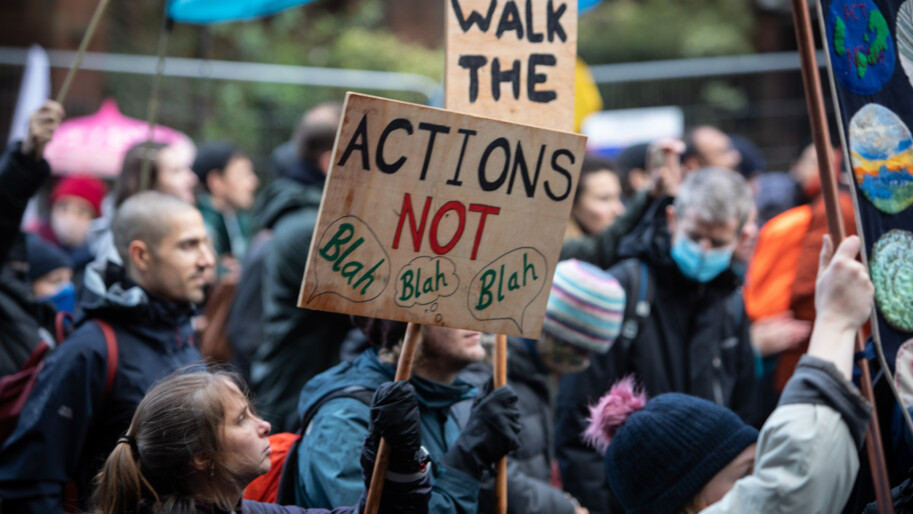What an invigorating, inspiring, challenging, and frustrating ten days in Glasgow for the United Nations annual global climate summit, COP26. There were almost 40,000 people registered and up to 10,000 there any single day, even with attendance limited due to COVID. People from all over the world came together to share their stories of climate impacts at home, exchange ideas for reducing climate pollution, and find ways to increase resilience.
I heard the leaders of Pacific Island nations passionately warn that some of their land is already underwater from sea level rise. I met amazing local activists like Ayo Alowoyeye from Nigeria, who works on peace and climate in rural communities with little to no electricity. And I marched in the streets of Glasgow during one of the largest climate rallies in history.
At the end of almost two weeks there, I’m left with conflicting feelings.
It was inspiring to be with thousands of people from all over the world who are working every day to solve the climate crisis. Those in Glasgow advocating for ambitious climate action — activists, scientists, young people, Indigenous communities, and more — were there in significantly greater numbers than those working against progress. And COP26 itself yielded encouraging important steps forward.
- More than 130 countries committed to reducing methane emissions — a dangerous super pollutant — 30 percent by 2030.
- Denmark and Costa Rica led the formation of the Beyond Oil and Gas Alliance (BOGA).
- For the first time, a COP outcome document included reference to the primary cause of the climate crisis, calling upon nations to accelerate “the phase-down of unabated coal power and inefficient fossil fuel subsidies.”
- Signed by 120 countries, the Glasgow Leaders’ Declaration on Forests and Land Use aims to halt and reverse forest loss and land degradation by 2030.
- Countries also committed to avoiding double-counting offsets. Interestingly, many Global South countries argued strongly to keep offsets as a source of adaptation funding.
- And, finally, the amount of money committed from wealthy countries to help the Global South prepare for climate impacts doubled this year (though the amount pledged still hasn’t reached the $100 billion promised in 2009).
All of these commitments are indeed important, but incrementalism won’t cut it. Together, this still isn’t enough to stop dangerous levels of warming. And it’s yet to be seen how these promises will translate into action.
It was daunting to see up close how slow progress really is — far too slow considering the onslaught of climate disasters we’re already experiencing at just 1.2 degrees Celsius of warming so far. The Glasgow Climate Pact reached in the final hours of the conference was a disappointment. The commitments from world leaders were simply too little, leaving us well off the pace to limit warming to 1.5 degrees Celsius as aspired to in the 2015 Paris Climate Agreement.
It especially frustrates me that the same actors that slow our progress in California — oil and gas interests — are working to slow progress globally. In fact, if the 503 fossil fuel lobbyists at COP26 were a country, they would have had the largest delegation at the conference. The science is clear and the climate reality is worsening before our very eyes, yet the desire to maintain short-term profits for a wealthy few is putting the health of billions of people in jeopardy.
My experience in Glasgow made me even more certain about the need for California to step up its role on the global climate action stage. As the fifth-largest economy in the world and a major oil and gas producing state, California can and must lead in the race against catastrophic climate change.
I was delighted when Assembly Speaker Anthony Rendon recognized in Glasgow that California has fallen behind the rest of the world after he met with his counterparts on the cutting edge of climate solutions. Even the San Francisco Bay Area where I live — and where so many of the clean energy technologies the rest of the world is counting on were pioneered — isn’t reducing emissions fast enough.
California has the technology and knowledge to do exactly what’s needed. We just need the political will. Our leaders, from the governor and state legislators to local elected officials, must summon the courage to stand up to oil and gas interests and prioritize the well-being of our communities over corporate polluters. As goes California, goes the world. The success of our Climate-Safe California campaign for an accelerated, equitable transition to a vibrant, healthy, and green economy for all will inspire and catalyze others around the globe to do much more, much faster.
I spoke to some of the state lawmakers who attended COP26 in Glasgow. They are returning home fired up to restore California’s climate leadership. Progress is slower than I hoped for on the global stage right now, but with all of us working together here at home, California will blaze a path forward to a climate-safe future for all.


